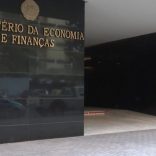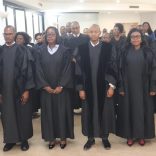Mozambique adds over €12 million to public debt in Q2 2025"
“Attacks and abductions will not harm investment in Mozambique”

DW/ Destruction at the headquarters of the administrative post of the Macomia district (June 2018)
According to the Minister of Industry and Commerce of Mozambique, despite recent events, Mozambique continues to attract foreign investment not only in the energy sector, but also in the tourism sector.
“The characteristics of the terrorist attacks”, which have recently occurred in northern Mozambique, “seem to be provoked by individuals imbued with ideology,” Mozambican Minister of Industry and Commerce Ragendra de Sousa said when asked by DW Africa if Mozambique continues to be an attractive country for gas multinationals, such as the American Anadarko and the Italian ENI, given the attacks in production area of the Rovuma Basin.
“The deaths we are seeing are deaths by machete blows and I do not call death by machete guerrilla warfare,” the minister told DW Africa during a visit to Lisbon. I addition those responsible for these attacks are based outside of Mozambique, de Sousa said. “Our security forces have been taking the necessary steps, but as you know, the province is big.”

Attacks and abductions
The attacks in the province of Cabo Delgado are of concern to the Mozambican government, which thinks that the solution to the problem cannot be purely a military one. “We are aware of the risk, but [the solution] has to be military, economic and social,” de Sousa said, adding that companies did not need to resort to private security meansures.
“I do not think that, in the sense that if this is a guerrilla war, we have to hire private security. No: our security forces are capable of restoring order and tranquillity. Coordinated and combined, bringing people to safe areas, improving the employment situation, improving the infrastructure situation: all of this will happen precisely through the implementation of the projects,” he said.
The Minister Sousa added that companies investing in the exploitation of Mozambican natural resources knew how to carry out a proper risk analysis when they decided to back the country.
But what about the kidnapping of foreign and national businesspeople in Mozambique? Isn’t this practice making it difficult to attract investment?

“If you look at it from the historical point of view, abductions are decreasing,” Sousa replied. “If we compare with other countries and talk to the entrepreneurs themselves, they continue to say that Mozambique is much more stable. We are saying that we acknowledge the problem, and we are doing our part, with the resources we have, to put a stop to it.”
Priority sectors
With regard to the extent that foreign investments for natural resource mega-projects are on the rise, Ragendra de Sousa recalls that the Five-Year Government Plan has agriculture, energy, infrastructures and tourism as priority sectors. “In the energy sector, for me megaprojects are the activities that the country needs. We have to solve the problem of the balance of trade.”
But it is also necessary to “solve the problem of the budget” and, with an increase in the country’s production base and the export of graphite, Sousa predicts stability for the Mozambican currency.
Ragendra de Sousa reaffirmed Mozambique’s interest in welcoming more German investment and, as an economist, foresees the country continuing to be attractive.
“Southern Africa will grow by 2.1 percent and Mozambique will grow by 3.7 percent, with our interest rate falling from 32 to 20 percent to 10 to 12 percent by 2020. Only two more years to go, let us be patient. The state is working; investment projects are working,” he said, citing data from the latest World Bank report.
The minister said that Mozambique was doing everything to normalise relations with the International Monetary Fund (IMF) and that this would revitalise the economy and business.
Ragendra de Sousa was accompanied on his five-day visit to Portugal by a team that has promoted business and investment opportunities in the country, in the context of the changes that have been taking place in the economy in the mining and energy se ctors
The mission took part in a roadshow in Lisbon and Oporto organised by AICEP Portugal Global and APIEX – Agency for the Promotion of Investment and Exports of Mozambique.
According to the minister, Mozambique also wants to strengthen ties with Portuguese universities as a means of developing its human capital.












Leave a Reply
Be the First to Comment!
You must be logged in to post a comment.
You must be logged in to post a comment.